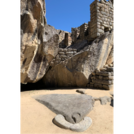
Students will use knowledge of aquatic and terrestrial environments to identify fossils and predict environmental changes over time.
- Subject:
- Physical Science
- Material Type:
- Lesson Plan
- Author:
- Out Teach
- Date Added:
- 07/22/2021

Students will use knowledge of aquatic and terrestrial environments to identify fossils and predict environmental changes over time.

This resource is a video abstract of a research paper created by Research Square on behalf of its authors. It provides a synopsis that's easy to understand, and can be used to introduce the topics it covers to students, researchers, and the general public. The video's transcript is also provided in full, with a portion provided below for preview:
"Around 125,000 years ago Earth was relatively warmer than today All because Earth’s orbit permitted greater exposure to incoming solar rays This time period provides an example of how Earth’s climate might respond to future warming A recent study used fossil corals to explore past changes within the Tropical Atlantic a region sensitive to shifts in the rain belt that spans the equator Any effect this has on water bodies is captured within the reefs built by corals Oxygen isotopes within seven corals reveal 85 years of seasonal climate change Pairing the coral data with computer simulations showed the rain belt moved farther north bringing more summer rain to the islands of the South Caribbean, such as Bonaire in contrast to the dry weather found in the region today Brocas et al. Last Interglacial Hydroclimate Seasonality Reconstructed From Tropical Atlantic Corals..."
The rest of the transcript, along with a link to the research itself, is available on the resource itself.
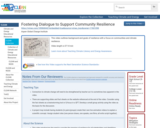
This video outlines background and goals of resilience with a focus on communities and climate resilience.
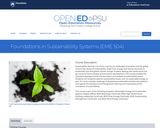
Sustainability denotes one of the main future challenges of societies and the global community. Issues of sustainability range from energy and natural resources to biodiversity loss and global climate change. Properly dealing with these issues will be crucial to future societal and economic development. This course provides the theoretical background for the discussion and analysis of sustainability issues. Students will recognize specific sustainability issues, such as sustainable energy, as part of a more complex challenge of developing sustainable societies and systems, and against the background of the general meaning and implications of the conception of sustainability.
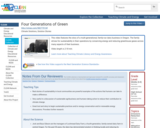
This video features the story of a multi-generational, family-run dairy business in Oregon. The family strives for sustainability in their operations by conserving energy and reducing greenhouse gases across many aspects of their business.
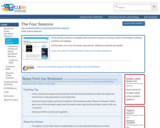
In this activity, students investigate what causes the seasons by doing a series of kinesthetic modeling activities and readings.

Urban governance comprises the various forces, institutions, and movements that guide economic and physical development, the distribution of resources, social interactions, and other aspects of daily life in urban areas. This course examines governance from legal, political, social, and economic perspectives. In addition, we will discuss how these structures constrain collective decision making about particular urban issues (immigration, education…). Assignments will be nightly readings and a short paper relating an urban issue to the frameworks outlined in the class.
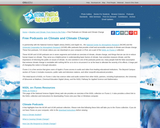
In partnership with the National Science Digital Library and Apple, NCAR and UCAR offer podcasts that provide a brief and accessible overview on climate and climate change. These podcasts, short 5-8 minute videos you can download on your computer or iPod, are a part of the NSDL on iTunes U collection.

In this classroom activity, students analyze regional energy usage data and their own energy bills to gain an understanding of individual consumption, regional uses, costs, and sources of energy.
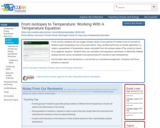
In this activity, students will use oxygen isotope values of two species of modern coral to reconstruct ambient water temperature over a four-year period. They use Microsoft Excel, or similar application, to create a spreadsheet of temperature values calculated from the isotope values of the corals by means of an algebraic equation. Students then use correlation and regression techniques to determine whether isotope records can be considered to be good proxies for records of past temperatures.
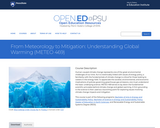
Human-caused climate change represents one of the great environmental challenges of our time. As it is inextricably linked with issues of energy policy, a familiarity with the fundamentals of climate change is critical for those looking to careers in the energy field. To appreciate the societal, environmental, and economic implications of policies governing greenhouse gas emissions, one must understand the basic underlying science. METEO 469 serves to lay down the fundamental scientific principles behind climate change and global warming. A firm grounding in the science is then used as a launching point for exploring issues involving climate change impacts and mitigation.
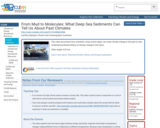
This video documents how scientists, using marine algae, can study climate change in the past to help understand potential effects of climate change in the future.
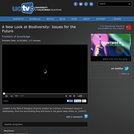
Leaders in the field of biological diversity present an overview of emergent issues in biodiversity, from the surrounding flora and fauna to the genes deep within us. (117 minutes)
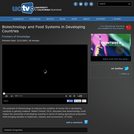
The potential of biotechnology to improve the condition of human life in developing countries is gaining credence. Robert Timmer, Ph.D. discusses how biotechnology could impact the economies of developing countries in terms of raising agricultural production while bringing benefits to healthcare, industry and environment. (28 minutes)
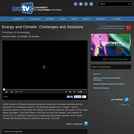
UCSD Division of Physical Sciences presents a discussion on global warming and the prospects of a hydrogen economy. The featured speakers are: Joseph J. Romm, executive director of the Center for Energy and Climate Solutions and author of The Hype About Hydrogen - Fact and Fiction in the Race to Save the Climate; and Franklin M. (Lynn) Orr, Jr. professor of petroleum engineering and project director of the Global Climate and Energy Project at Stanford University. (59 minutes)

The rapid depletion of fossil fuels and the rising sea level from the warming of the earthŐs atmosphere are converging to dramatically alter our future. Edward Mazria, founder of Architecture 2030, unveils a new study of sea level rise showing fly-over 3D images depicting potentially calamitous coastal and national impacts. (57 minutes)
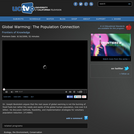
Dr. Joseph Bookstein argues that the real cause of global warming is not the burning of fossil fuels but rather the needs and wants of the global human population, now over 6.6 billion. He discusses methods, feasibility, and implementation strategies for voluntary population reduction. (52 minutes)
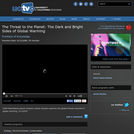
2008 Nierenberg Award recipient James Hansen explores the global threats inherent in global warming. (55 minutes)
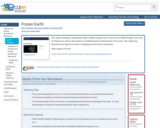
This video montage of spectacular NASA satellite images set to music shows different types of ice and ice features as well as descriptions of satellite-based measurements of ice cover. Text captioning describes how global ice cover is changing, and how this is measured.
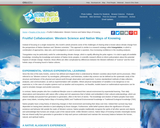
This article presents some aspects of the societal and scientific challenges of sharing what is known about climate change by offering insights from Native Alaskans and Western scientists.